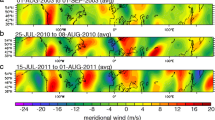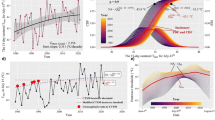Abstract
Extremal events are difficult to model since it is difficult to characterize formally those events. The 2003 heat wave in Europe was not characterized by very high temperatures, but mainly the fact that night temperature were no cool enough for a long period of time. Hence, simulation of several models (either with heavy tailed noise or long range dependence) yield different estimations for the return period of that extremal event.
Similar content being viewed by others
References
Alexander LV, Zhang X, Peterson TC, Caesar J, Gleason B, Klein Tank A, Haylock M, Collins D, Trewin B, Rahimzadeh F, Tagipour A, Ambenje P, Rupa Kumar K, Revadekar J, Griffiths G, Vincent L, Stephenson DB, Burn J, Aguliar E, Brunet M, Taylor M, New M, Zhai P, Rusticucci M, Vazquez-Aguirre JL (2006) Global observed changes in daily climate extremes of temperature and precipitation. J Geophys Res 111:1–22
Beniston M (2004) The 2003 heat wave in Europe: a shape of things to come? An analysis based on Swiss climatological data and model simulations. Geophys Res Lett 31:2022–2026
Black E, Blackburn M, Harrison G, Hoskings B, Methven J (2004) Factors contributing to the summer 2003 European heatwave. Weather 59:217–223
Braun M, Dutzik T, Davis M, Didisheim P (2004) Driving global warming. Environment Maine Research and Policy Center
Bouëtte JC, Chassagneux JF, Sibaï D, Terron R, Charpentier A (2006) Windspeed in Ireland: long memory or seasonal effect? Stoch Environ Res Risk Assess 20:141–151
Brockwell PJ, Davis RA (1991) Time series: theory and methods. Springer, Berlin
Burt S (2004a) The August 2003 heatwave in the United Kingdom. Part I: maximum temperatures and historical precedents. Weather 59:199–208
Burt S (2004b) The August 2003 heatwave in the United Kingdom. Part III: minimum temperatures. Weather 59:272–273
Burt S, Eden P (2004) The August 2003 heatwave in the United Kingdom. Part II: the hottest sites. Weather 59:239–246
Dempster AP, Liu C (1995) Trend and drift in climatological time series. In: Proceedings of the 6th International Meeting on Statistical Climatology, Galway, Ireland, pp 21–24
Fink AH, Brucher T, Kruger A, Leckebusch GC, Pinto JG, Ulbrich U (2004) The 2003 European summer heatwaves and drought. Synoptic diagnosis and impacts. Weather 59:209–215
Gray HL, Zhang NF, Woodward W (1989) On generalized fractional processes. J Time Ser Anal 10:233–257
Haslett J, Raftery AE (1989) Space-time modelling with long-memory dependence: assessing Ireland’s wind power resources. J R Stat Soc 38:1–50
Hosking JRM (1981) Fractional differencing. Biometrika 68:165–176
Houghton JT (1997) Global warming. Cambridge University Press, Cambridge
Hurst HE (1951) Long-term storage capacity of reservoirs. Trans Am Soc Civ Eng 116:770–799
IPCC (2001) Climate Change 2001: The scientific basis. GRID-Arendal. http://www.grida.no/publications/other/ipcc_tar/?src=/climate/ipcc_tar/
IVS (Institut de Veille Sanitaire) (2003) Impact sanitaire de la vague de chaleur en France survenue en août 2003. Available at http://www.invs.sante.fr/publications/2003/chaleur_aout_2003/
Karl TR, Knight RW (1997) The 1995 Chicago heat wave: how likely is a recurrence? Bull Am Meteorol Soc 78:1107–1119
Karl TR, Trenberth KE (2003) Modern global climate change. Science 302:1719–1723
Kovats RS, Koppe C (2005) Heatwaves past and future impacts on health. In: Ebi K, Smith J, Burton I (eds) Integration of public health with adaptation to climate change: lessons learned and new directions. Taylor & Francis, Lisse
Lane LJ, Nichols MH, Osborn HB (1994) Time series analyses of global change data. Environ Pollut 83:63–68
Luterbacher J, Dietrich D, Xoplaki E, Grosjean M, Wanner H (2004) European seasonal and annual temperature variability, trends, and extremes since 1500. Science 303:1499–1503
Mandelbrot BB (1965) Une classe de processus stochastiques homothétiques à soi: application à la loi climatique de H.E. Hurst. C R Acad Sci 260:3274–3277
Meehl GA, Tebaldi C (2004) More intense, more frequent, and longer lasting heat waves in the 21st century. Science 305:994–997
Nogaj M, Parey S, Dacunha-Castelle D (2007) Non-stationary extreme models and a climatic application. Nonlinear Process Geophys 14:305–316
Pirard P, Vandentorren S, Pascal M, Laaidi K, Le Tertre A, Cassadou S, Ledrans M (2005) Summary of the mortality impact assessment of the 2003 heat wave in France. EuroSurveillance 10:153–156
Poumadre M, Mays C, Le Mer S, Blong R (2005) The 2003 heat wave in France: dangerous climate change here and now. Risk Anal 25:1483–1494
Quereda Sala J, Gil Olcina A, Perez Cuevas A, Olcina Cantos J, Rico Amoros A, Montón Chiva E (2000) Climatic warming in the Spanish Mediterranean: natural trend or urban effect. Clim Change 46:473–483
Rocha Souza L, Soares LJ (2007) Electricity rationing and public response. Energy Econ 29:296–311
Samarov A, Taqqu M (1988) On the efficiency of the sample mean in long-memory noise. J Time Ser Anal 9:191–200
Smith RL (1993) Long-range dependence and global warming. In: Barnett V, Turkman KF (eds) Statistics for the environment. Wiley, New York, pp 141–161
Trigo RM, García-Herrera R, Diaz J, Trigo IF, Valente MA (2005) How exceptional was the early August 2003 heatwave in France? Geophys Res Lett 32:L10701. doi:10.1029/2005GL022410
WHO (World Health Organization) (2004) Heat-waves: risks and responses. In: Health and global environment change series, no. 2. World Health Organization Regional Office for Europe, Copenhagen, Denmark. Available at http://www.euro.who.int/document/E82629.pdf
Yajima Y (1988) On estimation of a regression model with long-memory stationary errors. Ann Stat 16:791–807
Yajima Y (1991) Asymptotic properties of the LSE in a regression model with long-memory stationary errors. Ann Stat 19:158–177
Yan Z, Jones PD, Davies TD, Moberg A, Bergstrom H, Camuffo D, Cocheo C, Maugeri M, Demaree G, Verhoeve T, Thoen E, Barriendos M, Rodriguez R, Martin-Vide J, Yang C (2002) Trends of extreme temperatures in Europe and China based on daily observations. Clim Change 53:355–392
Author information
Authors and Affiliations
Corresponding author
Additional information
The financial support from the AXA Chair on Large Risks in Insurance (Fondation du Risque) is gratefully acknowledged.
An erratum to this article can be found at http://dx.doi.org/10.1007/s10584-011-0262-y
Rights and permissions
About this article
Cite this article
Charpentier, A. On the return period of the 2003 heat wave. Climatic Change 109, 245–260 (2011). https://doi.org/10.1007/s10584-010-9944-0
Received:
Accepted:
Published:
Issue Date:
DOI: https://doi.org/10.1007/s10584-010-9944-0




